12.10.2023 | Case | Eastern Europe | Energy Efficiency | Ukraine
Through grant funding from the European Union, together with Nefco, a time-worn school building in the village of Susk has been given a much-needed update. Beyond saving energy, the improvements also boost the health and well-being of close to 200 students and staff, including Internally Displaced Persons (IDPs) due to the war, by creating a more comfortable learning environment.
Read the case story in Ukrainian
The lyceum in the village of Susk, Lutsk district in western Ukraine, has stood as a beacon of education for generations. It serves a diverse student population, including those from low-income families, children with disabilities, and orphans. The aging school building in Susk, however, was in dire need of repair.
Over the years, the structure’s outdated heating system, lack of mechanical ventilation, and poor building envelope – the building components that separate the indoors from the outdoors – not only raised energy costs but also negatively impacted the health and well-being of close to 200 students and staff. This number includes Internally Displaced Persons (IDPs) due to the war.
The uncomfortable indoor temperatures and poor air quality contributed to health issues and insufficient conditions for quality education. This situation prompted a visionary initiative to revamp the school’s infrastructure and bring about transformative change.
Close to 200 students and staff, including Internally Displaced Persons (IDPs), are expected to benefit from the upgrade.
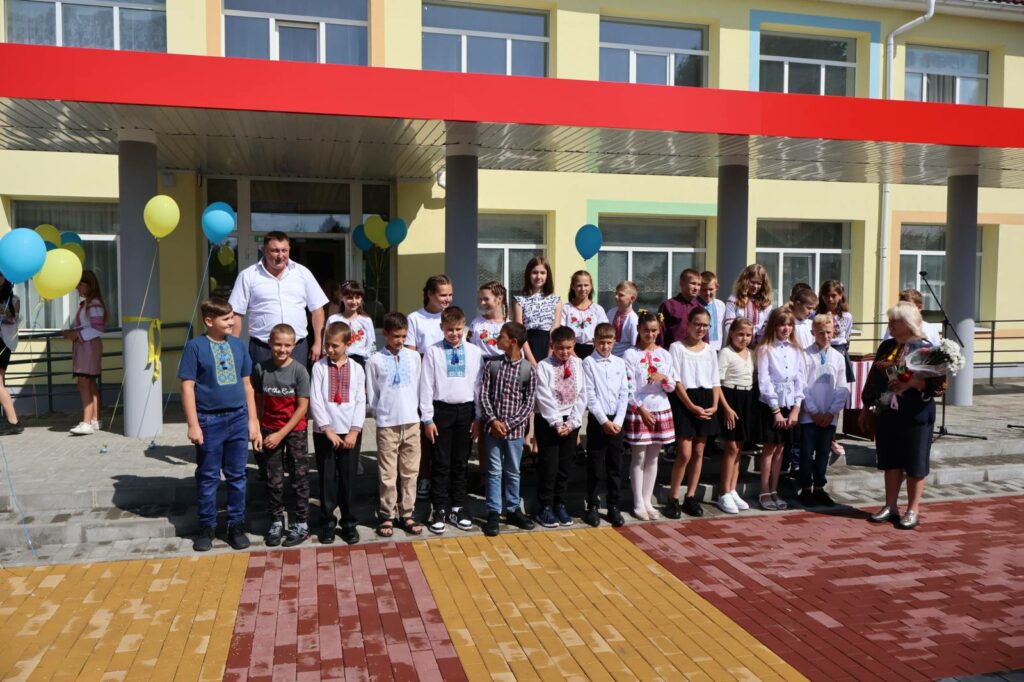
The time has come to modernise
Commissioned in 1974, the school building had seen little repair work since its construction. While its walls, made of red brick and with a thickness of 0.51 meters, provided some heat resistance, they were insufficient to prevent heat loss. The heating system relied on solid fuels and hot water was prepared using electric heaters, further exacerbating energy inefficiency.
Furthermore, the city council has struggled for decades with insufficient investment in infrastructure projects. Limited financial and institutional capacity has hindered significant infrastructure rehabilitation, including the thermal insulation of public buildings.
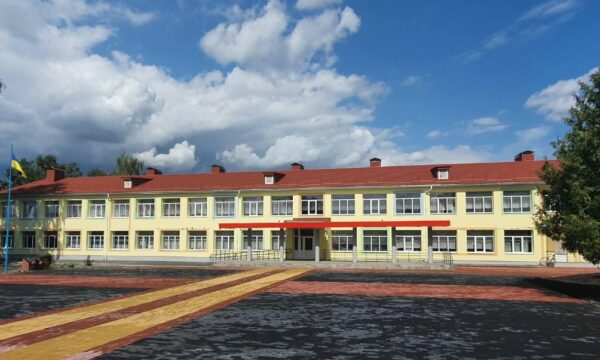
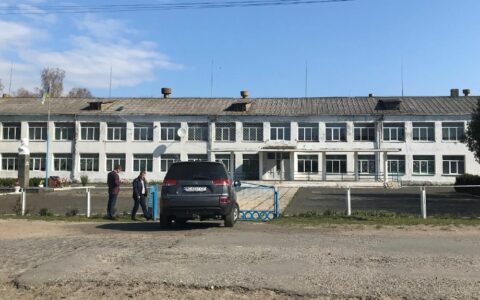
Photos of the buildings before and after the project. Photos: Department of Organizational Work, Information and Public Relations, Kivertsi City Council
Proper funding supports a sustainable vision
In 2021, work began to improve the education facility’s energy efficiency. To promote the successful implementation of this undertaking, the European Union, in partnership with Nefco – the Nordic Green Bank, allocated a grant of EUR 480,000, the total cost of the project. The European Union also provided funds for technical assistance.
“This project is about ensuring that every child has access to a safe and comfortable learning environment.”
Oleksandr Kovalchuk, Mayor of Kivertsi.
“Increasing the energy efficiency of the lyceum in Susk will help reduce energy costs. It is a step forward in strengthening Ukraine’s energy security and energy independence. The EU is prepared to support Ukraine in its reconstruction and modernisation efforts and offer our expertise to rebuild the country’s economy,” says Chloé Allio, Head of Operations Section Economic Cooperation, Energy, Infrastructure and Environment.
The project scope included enhancing the insulation of the school’s building envelope to significantly reduce heat loss and modernising the heating system to minimise reliance on fossil fuels. It also involved introducing mechanical ventilation to improve indoor air quality and create a more comfortable learning environment and implementing repairs to further reduce heat and electricity consumption.
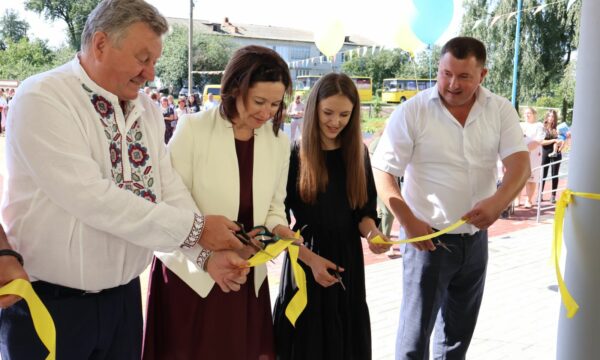
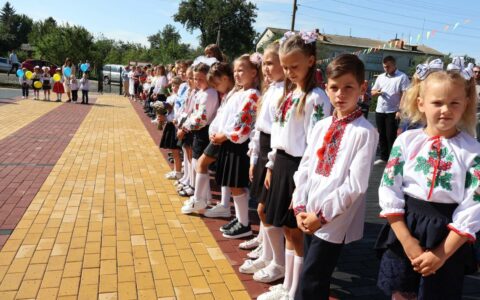
“We are very grateful to the EU and Nefco for the possibility to implement such an important project during a time of war. This project is not just about saving energy; it’s about ensuring that every child, regardless of their background, has access to a safe and comfortable learning environment. We are committed to building back greener and better,” says Oleksandr Kovalchuk, Mayor of Kivertsi.
“By securing grant funding from the EU for the project managed by Nefco and combining it with municipal resources, the Kivertsi City Council was able to successfully execute this vital energy efficiency project despite the ongoing war. Currently most of the municipalities are suffering tremendous strain on their financial and human resource capacity,” says Julia Shevchuk, Chief Investment Advisor at Nefco.
Empowering change is not just about numbers and metrics
In September 2023, a ceremonial opening of the institution took place after the completion of major renovations. The improvements are expected to generate savings of approximately 61 tonnes/year of heat fuel (solid fuel) and 45 MWh/year of electricity. CO2 emission reductions are calculated at approximately 148 tonnes/year. These upgrades will save the city anywhere from EUR 25,900 to EUR 30,500 annually.
The project’s true success, however, extends beyond mere numbers. The school’s improved indoor temperature and air quality are set to profoundly impact the health and well-being of students and staff.
Work to improve the education facility’s energy efficiency began in 2021 and was completed in September 2023.
Future activities aim to boost resilience
Nefco continues to carry out projects in Ukraine aimed at increasing energy efficiency, which is a systematic way to reduce greenhouse gas emissions and mitigate climate change. In Ukraine, Nefco’s energy efficiency projects often result in a 50% reduction in energy usage.
Nefco is also involved in the reconstruction of municipal infrastructure, an important aspect to strengthen resilience and respond to threats caused by the war. These recovery investments work to provide Ukraine with a new and EU-aligned pathway for sustainable reconstruction and a faster green transition.
In Ukraine, Nefco’s energy efficiency projects often result in a 50% reduction in energy usage
Through NIP Ukraine Energy Efficiency in Small and Amalgamated Municipalities Programme, the modernisation of the street lighting network and the installation of energy-efficient LED lamps in Tetiiv, Adrushivka and Radomyshl, as well as the thermal renovation of city buildings in Slavutych and Khmelnitsky, are being completed. Approximately 80,000 residents, including IDPs, will benefit from the implementation of these projects.
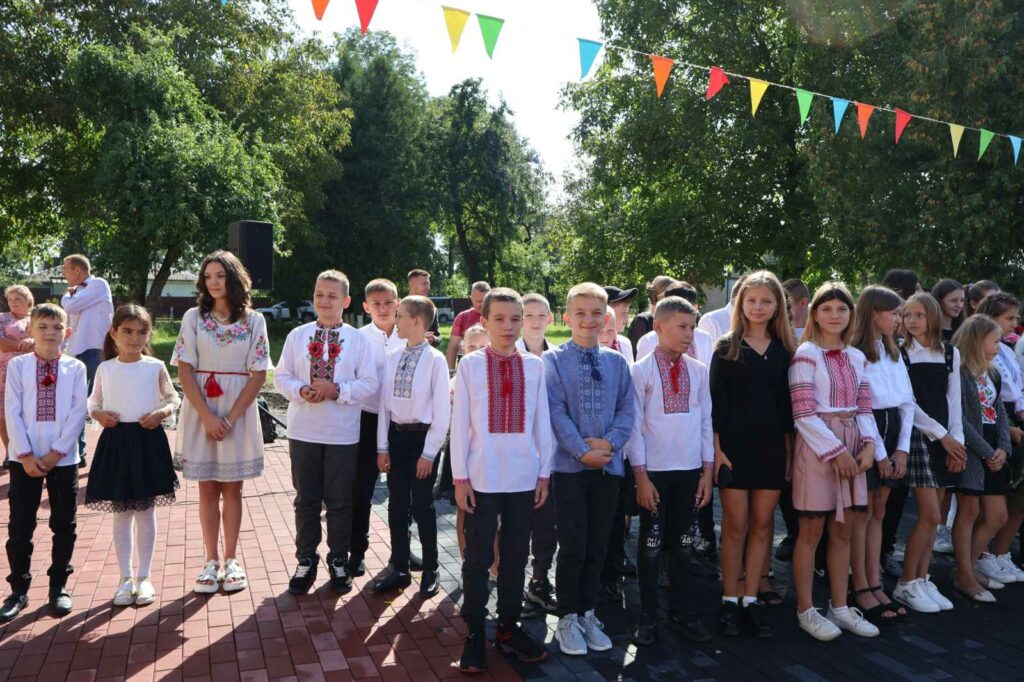
Nefco launched the Green Recovery Programme for Ukraine to support municipalities in repairing and rebuilding war-damaged infrastructure in an environmentally sound way, as well as in accommodating IDPs.
This action is funded by the European Union and managed by Nefco. Nefco is committed to working towards a green recovery in Ukraine together with its Nordic owners and the EU to ensure that Ukraine is built back greener and better. In addition to this action, Nefco is currently managing five more programmes funded by the EU, including supporting the modernisation of water supply systems, the implementation of energy-efficiency measures in public buildings and street lighting networks and the construction, reconstruction, and renovation of public buildings to support urgent housing needs for internally displaced persons (IDPs).
For further information, please contact:
